Many tales end with a wedding, but this one begins with a wedding.
Once upon a time, in a land where dwarfs — the elven kind, not the human kind — roamed misty woods and worked deep into enchanted mines, a grand castle stood at the edge of a dark forest. And in this castle lived a prince, as noble and kind as a prince could be. When he decided to get married, he could have easily chosen any of the noble ladies who longed to be his wife. But instead, he chose a simple kitchen maid named Adelaide.
Adelaide had been born to a poor couple who passed away when she was very young. She journeyed through towns and villages, seeking work and shelter, until her path led her to the castle. There she met Doris, the head cook. Doris was a warm-hearted woman with a special fondness for children, even though she had none of her own. Seeing Adelaide’s weary face and hollow eyes, Doris took her in, gave her work, and raised her as if she were her own daughter.
Under Doris’s gentle care, Adelaide blossomed into a charming young woman. She learned to prepare sumptuous roasts, tangy sauerkraut, and luscious black forest cakes — all of which became the talk of the castle. Yet what won the prince’s heart was not merely her cooking, but her gentle smile and clever jokes. He began visiting Adelaide in the kitchen often, delighting in her company, until the two became inseparable.
When the prince finally asked for her hand in marriage, Adelaide was speechless. “You wish to marry me?” she asked in disbelief. “A simple kitchen maid? Surely, a princess or a noble lady would suit you better.”
“But none possess your gentle smile or witty jokes,” the prince replied, taking her hand in his. “I love you, and I believe you love me too. If you wish, we can spend our lives together.”
“Oh, yes, I do!” Adelaide exclaimed, her heart soaring, and they shared a joyful, tender kiss.
The wedding was celebrated with great splendor, and Adelaide became a princess. Within a year, the old king and queen passed away, and the prince ascended the throne as the new king, with Adelaide by his side as queen. At first, she found it strange to set aside the labors of her old life, but soon she grew accustomed to her new role. It almost seemed as if she’d been destined to be a queen.
Grateful for her good fortune, Adelaide strove to bring comfort and joy to all who lived in the castle. Doris was appointed head nursemaid, so that she and Adelaide could always remain close. Doris settled into her new role with ease, for her kindness was boundless, and her heart as warm as ever.
For a time, all was well. The new king and queen ruled over the land with fairness and wisdom. But then came the whispers. They were faint and fleeting at first, but soon they grew louder — though they always stopped when Adelaide entered the room.
“Did you speak of me?” she would ask.
“Not at all, Your Majesty!” came the replies. “We were speaking of something else.”
Sometimes they told the truth. But other times, Adelaide felt the weight of their unspoken words. Raised in a world of kindness, she could not fathom why anyone would treat her otherwise, especially when she had done them no harm. And yet the whispers lingered in her thoughts, growing louder in her mind than any words of praise.
“No queen would say such a thing.”
“No queen would act that way.”
“No queen would wear such a gown.”
She tried to dismiss them at first, reasoning that every ruler had naysayers. But their words continued to linger in her mind. Adelaide began to notice how much her subjects seemed to care for her appearance — her gowns, her hair, her jewels — more than her deeds. Fear crept into her heart — a fear that one day, someone younger and more beautiful might take her place and steal away all she held dear.
Over time, the hours she once devoted to the affairs of the realm were now spent in front of the mirror. She tried on many gowns and intricate hairstyles, and sought potions and salves to preserve her youth.
“But you are beautiful as you are,” the king would tell her with a smile.
“There’s no need for all this, my dear,” Doris would say gently.
But Adelaide only laughed, brushing aside their concerns. “I simply enjoy looking beautiful,” she insisted. “It makes me feel beautiful.” But behind her carefree smile, doubt began to take root in her heart. Her desire for admiration grew as fiercely as her longing for love once had.
As the years passed, Adelaide became known as the fairest in the land. Her soft voice, radiant face, and graceful manners captivated all who beheld her. While the king tended to matters of state, Adelaide filled her days with lavish banquets and extravagant balls, tirelessly preserving her place as the fairest in the land.
Doris, however, remained unchanged — always kind-hearted and true. She pleaded with Adelaide to return to her old self, to cast off her pride and bitterness. But Adelaide would smile and assure her that nothing had changed. “I’m the same as I ever was,” she’d say, though Doris knew better.
Adelaide loved all things beautiful. But of all her dresses and jewels and trinkets, her most treasured possession was a mirror. It was large, framed in gleaming gold, and hung above the dresser in her chamber. But this was no ordinary mirror — it was a magic, talking mirror, a gift from the dwarf king on her wedding day.
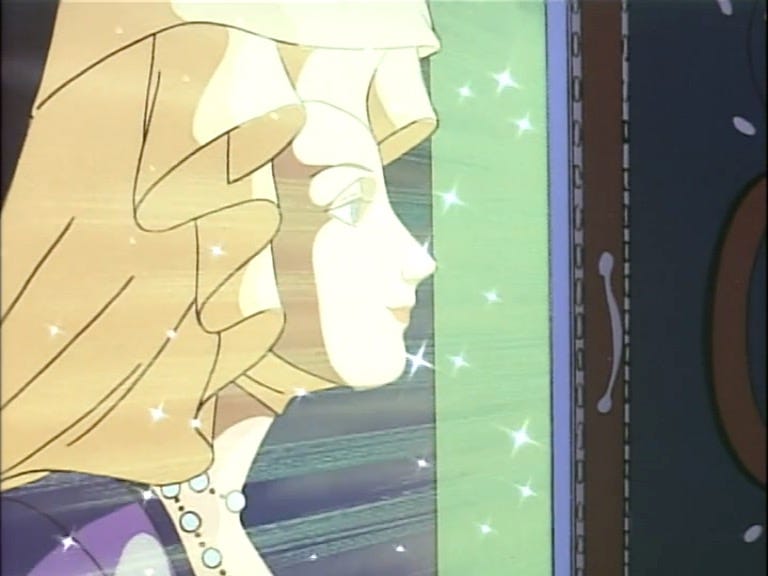
No one else knew of its magic, for Adelaide used it in secret, always alone in her chamber. When she did, she would stand before the mirror and ask:
“Mirror, mirror, on the wall, Who in this land is the fairest of all?”
A strange light would glimmer within its depths, and the mirror would reply, its voice as soft as the whisper of leaves:
“You, my queen, are fair, it’s true, No one in the land is more admired than you.”
And each time Adelaide would be satisfied, for she knew that the mirror could only speak the truth.
***
Time passed, and Adelaide found herself with child. The entire realm rejoiced at the news, their cheers echoing through castle halls and village squares. Doris, ever devoted, stayed by Adelaide’s side, soothing her pains, offering gentle counsel, and, of course, ensuring her beauty shone as radiantly as ever.
One wintry morning, as snowflakes drifted from the sky like soft feathers, Adelaide sat by an open window. She was stitching a piece of embroidery, trying to calm her restless thoughts. Her mind wandered to dreams of the child she would soon hold, when suddenly—
“Ouch!”
A sharp prick from her needle broke her reverie. Three drops of crimson blood bloomed on her finger. They fell onto the snow-covered sill made of ebony, the scarlet red vivid against the white and black.
“What beautiful colours,” Adelaide murmured, entranced. “If only I had a child as beautiful as that: as white as snow, as red as blood, as dark as ebony.”
Weeks later, on the coldest night of the coldest winter, the queen’s wish came true. A daughter was born amidst the howling winds and flurries of snow. The child was frail and small, but she clung to dear life, like a snowdrop blooming through frozen ground.
“We should call her Snowdrop, for she is as strong as one,” Doris suggested with a smile.
“But Snow White is a much prettier name,” Adelaide said softly, her mind returning to that moment by the window. And Snow White she was named.
As soon as Adelaide’s labor was behind her, she swiftly returned to her life of gowns, jewels, and courtly splendour, leaving the care of her child to Doris. As the nursemaid gazed upon the infant in her cradle, she felt a pang of love unlike any she had known. Snow White was everything the queen had wished for: skin pale as snow, lips red as blood, and hair black as ebony. But it was her eyes — blue as the sea, innocent and deep — that captivated Doris the most. They were the very same eyes Adelaide had once possessed, before whispers and mirrors clouded her heart.
At that moment, Doris made a silent vow. “For as long as I live, I shall take care of this child. I shall love her as a true mother should.”
And so it was. While Adelaide busied herself with grand banquets and luxurious gowns, Doris tended to Snow White. She rocked her to sleep, fed her warm broth, and sang soft lullabies. It was Doris who witnessed Snow White’s first steps and heard her first words.
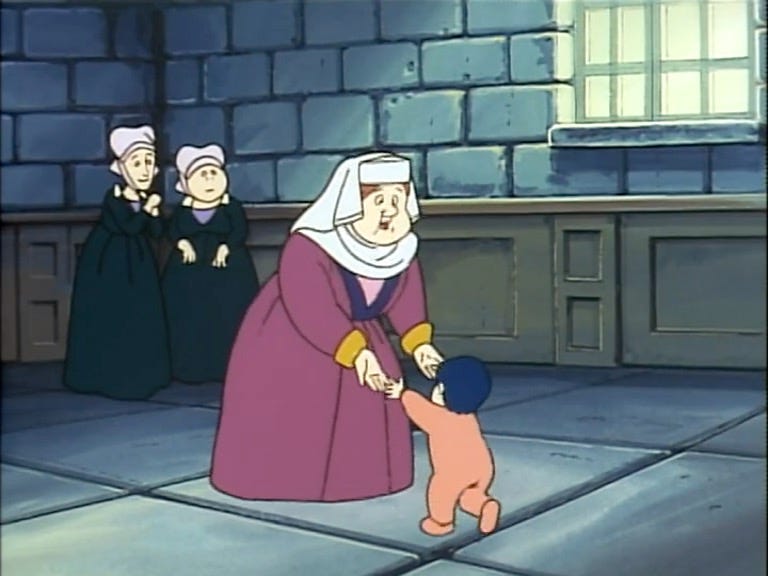
Adelaide, for her part, made occasional efforts to play with her daughter. She would cradle Snow White in her arms or lead her by the hand through the castle gardens. But these moments were fleeting — gestures made for the court’s approval or to reassure herself of her role as mother. Doris observed but said nothing.
“What a lovely child she’s becoming,” Adelaide remarked one day, as she watched Snow White toddle across the room. “As pretty as her mother.”
“Indeed she is,” Doris replied warmly, “and sweet too, with just a touch of mischief. Who knows? Perhaps she’ll grow to be even more beautiful than you.”
Doris spoke in jest, her tone light and playful, but her words struck Adelaide like a dagger to the heart. Snow White, more beautiful than her? The very idea was unthinkable. But as the child grew, her beauty seemed to blossom like the first bloom of spring. Unease began to stir in Adelaide’s heart.
That evening, Adelaide stood before her mirror and asked:
“Mirror, mirror, on the wall, Who in this land is the fairest of all?”
The mirror answered, its voice deep and unyielding:
“You, my queen, are fair, it’s true, No one in the land is more admired than you.”
Adelaide sighed in relief. The mirror could only speak the truth, and for now, what was true and what she wanted to be true were one and the same. Snow White was still but a child, far too young to rival her beauty. There was nothing to fear. Yet.
“Come here, my pretty child,” Adelaide called sweetly the next day. Snow White ran to her with a gentle laugh, Doris following close behind.
But behind her warm smile and honeyed words, jealousy began to take root, winding through her heart like a creeping vine. Snow White’s beauty was a tender bud now, but Adelaide feared the day it might bloom and cast her own into the shadows.
***
Years passed, and Snow White grew. She now had a governess to instruct her and a gentleman to teach her how to dance and sing. But even through all these changes, Doris remained steadfast by her side, loving her and doting on her like a true mother. Each autumn, Doris brought her the first apple from the castle garden — it was tangy and sweetly sour, not at all like the mellow fruit served to her parents weeks later. Every bite made Snow White shudder with delight.
Her father, consumed by matters of state, was seldom present to watch her grow. But whenever he could, he made time for her, taking her on long walks through the castle gardens and speaking to her of the world.
“Papa, why can’t I see you more often?” Snow White asked one day.
“As king, it is my duty to care for the realm and to be fair to my people,” he explained.
“You mean to be handsome for them?”
“No, my dear,” he replied with a chuckle. “To be just. A ruler must hear both sides of a dispute and make a decision that’s fair to all.”
Snow White said nothing, but she pondered over her father’s words long after their conversation.
Adelaide continued to spend time with Snow White, though whether out of maternal love, or a desire to show her motherly virtues to the court, even she couldn’t tell. Each morning, she dressed the girl in fine silks and brocades, lacing her tightly until her cheeks flushed pink.
“Why must I wear my dress so tight?” Snow White asked.
“A growing young lady needs a defined waist,” Adelaide replied.
At night, Adelaide loosened the bindings, gently untangled Snow White’s hair with a jewelled comb, and fed her apple slices from a crystal bowl. Though Snow White cherished these moments, a faint unease lingered in her heart whenever she was near the queen.
As Snow White grew, she blossomed into a free-spirited young lady. She climbed trees to pluck ripe apples, her favourite food. She ran barefoot through the gardens, never caring about spoiling her clothes. She explored the castle corridors with impish curiosity, much to Doris’s endless worry.
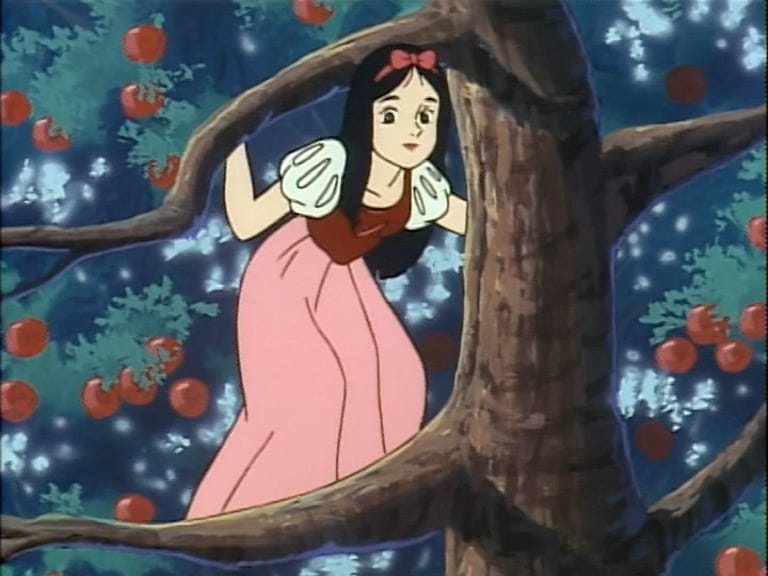
“Be careful, dear,” Doris would chide. “You’ll hurt yourself or ruin your gown!” But deep down, she was glad to see Snow White happy and full of life.
Adelaide, however, grew less amused. Snow White had abandoned her fine dresses and tight laces for simple, comfortable clothing, and she only allowed her hair to be combed when it was tangled beyond repair. But she still cherished their nightly rituals, the one time of day they felt like mother and daughter.
Snow White enjoyed looking beautiful as well, but her idea of beauty differed from the queen’s. She adorned her hair with flower garlands and used rouges and chalks made from crushed petals and minerals to brighten her face.
“Don’t you want to cinch your waist a little?” Adelaide asked one day, as she and Snow White were preparing for a royal outing. “People will be watching.”
“But then I couldn’t breathe,” Snow White replied.
“You should use a little less coal around your eyes. You’ll look old,” Adelaide added. “And that rouge doesn’t match your eyes or curls.”
“Well, I like it that way. Can I wear one of your brooches to the outing?”
“Certainly not!” Adelaide snapped. “They’re only for those who actually care about their appearance. You wouldn’t have any use for them.”
“I’m just having fun,” said Snow White quietly. “Why are you always so harsh about my appearance?”
“Because it’s survival, my dear, not fun,” Adelaide declared. “I’ve swallowed foul-tasting elixirs to make my hair glitter, taken burning serums to make my teeth shine, and even trained moths to flutter on my lashes and give them the perfect curve.”
Snow White’s eyes widened. “But... why? Why would you do all that?”
“As queen, I have to look perfect,” Adelaide said coldly. “But I wouldn’t expect you to understand. Stay here in the palace, if you like. I can go on this outing alone.”
Snow White left the room despondently and sought out Doris, who was busy working in the kitchen. She told her about the argument she’d had with the queen.
“Do you think I should try to look more like the queen?” Snow White asked.
“Only if it makes you happy,” Doris said gently. “But I think you should first try to look like yourself and see if it suits you. Bring your own idea of beauty to the world. Now, how about you help me prepare this gingerbread for dinner.”
Snow White smiled, put on an apron, and joined Doris in preparing the gingerbread. She often helped in the kitchen after her studies, finding far more joy in cooking than in sewing or sitting through the stifling chatter of the courtiers. Like her mother before her, she knew how to cook — and cook well.
As Snow White grew, she became the sort of person who could brighten a room just by stepping into it. Her kindness and warmth touched everyone she met: from the injured ducks she nursed back to health in the castle pond, to the haughty yet charmed courtiers of the palace. She visited the village often with Doris, offering counsel to the villagers and helping them in any way she could. Her beauty shone in her kindness, her laughter, and her love for life. Everyone in the realm loved her.
Adelaide noticed, too, how beloved Snow White was becoming. Once again, fear stirred in her heart. Once again, she turned to her mirror:
“Mirror, mirror, on the wall,
Who in this land is the fairest of all?”
Once again, the mirror replied:
“You, my queen, are fair, it’s true,
No one in the land is more admired than you.”
And once again, Adelaide smiled with relief. For now.
***
When Snow White turned sixteen, tragedy struck. Her father, the king, overwhelmed by the burdens of state, grew weak, and his health rapidly deteriorated. To the realm’s sorrow, he fell gravely ill and soon passed away. The entire realm mourned, but none more than Snow White and Doris.
Adelaide grieved for her husband as well, for she had truly loved him. But deep down in her now-stone heart, which had been consumed by an insatiable thirst for power, she felt a secret relief. As sole ruler of the realm, she could do as she pleased, unburdened by the need to feign kindness to anyone.
Soon, the realm withered under her rule. Once-bustling streets fell silent, and joy vanished from the lives of her subjects. Her guards roamed the land like ominous shadows of herself, collecting exorbitant taxes to fund her lavish balls and beauty treatments. Those who disobeyed were forced into harsh labor or left to starve in prison.
If Adelaide had once been beloved, now her very name provoked fear. Her gentle, easy-going nature had been consumed by greed and jealousy. If she desired something, she took it — whether from a child or an elder. Those she suspected of conspiring against her disappeared without a trace. And if she believed someone might rival her beauty, that person, too, would fade from sight. Whispers spread that she had even turned to sorcery to increase her power, but none dared speak of it openly for fear of her wrath.
The royal hunter, long discontent under the king’s rule, had become a frequent visitor to the castle — particularly to the queen’s chamber. He brought her the finest furs from the forest, and Adelaide flaunted them around the castle daily.
But amidst these darkened times, Snow White continued to blossom, her kindness and vitality undimmed. Her warmth brought smiles to those around her, and her beauty shone through her compassion and joy. She nurtured injured animals, assisted the castle servants, and accompanied Doris to the village, offering counsel and comfort to the townsfolk.
Adelaide noticed it all. Fearful of being surpassed, she sought to separate Snow White from the one who had guided her since childhood. So she summoned Doris to her chamber and coldly declared, “I am dismissing you from your services. You have one hour to leave the castle and never return.”
Doris gasped. “But Your Majesty, I’ve served this family faithfully for so many years — caring for Snow White since her birth, even tending to you when you were an orphan…”
“Enough!” snapped Adelaide. “I owe you no explanation. Leave, or face the consequences.”
Heartbroken, Doris obeyed. Snow White, devastated by the news, ran to her and embraced her tightly.
“We’ll meet again, my dear,” Doris whispered. “Remember to stay true to yourself and what you believe in. Be kind and fair to everyone. Take care.”
“I will,” Snow White promised, her eyes brimming with tears.
Doris settled in a modest home outside the realm, selling pastries and serving as a midwife. Meanwhile, Adelaide barred Snow White from attending royal events. The princess was untroubled by this, for she had never enjoyed the queen’s tiresome gatherings. In truth, she was relieved — now she could spend more time with the servants and secretly visit Doris.
But when the hunter reported these absences to the queen, she immediately summoned Snow White to her chamber.
“You’ve been wandering off a lot lately,” Adelaide said, her voice laced with false sweetness. “This won’t do for a princess like yourself. The subjects might think you are reckless — hardly worthy of the throne. From now on, you are forbidden from leaving the castle.”
“But I promised the village children I’d bring them toys tomorrow!” Snow White protested.
Adelaide’s smile widened, her eyes cold and calculating. Snow White stared at her, fear growing into her heart. After what felt like ages, the queen finally spoke.
“Tell me, Snow White, when you look at me, what do you see?”
Snow White hesitated. “A beautiful queen,” she answered carefully. “Everyone in the realm says so.”
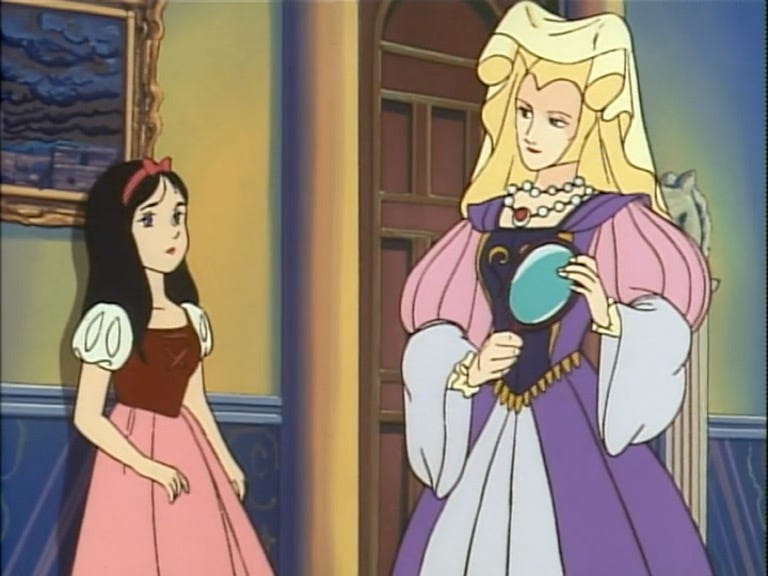
Adelaide snatched a hand mirror and thrust it before her. “Now take a good look in this mirror. Tell me, what do you see?”
“My reflection,” Snow White replied.
“And do you think you’re beautiful?”
“I don’t know,” Snow White murmured. “I’ve never thought about it.”
Adelaide sneered. “And yet everyone in the realm says you are. They say how kind you are. How generous you are. How beautiful you are. Some even whisper that one day, you will surpass me.”
“That’s only idle village talk,” Snow White said, her voice unsteady. “Everyone knows no one can compare to you.”
“Listen to me, Snow White, and listen well,” Adelaide said, stepping closer. “When I became queen, I was praised as the fairest in the land. I had to fight for my place, for the admiration I now hold. I will not allow anyone — least of all you — to take that from me.”
“Why can’t we both be admired?” Snow White asked.
“Because it’s either me or no one!” Adelaide spat, her voice sharp with fury. She leaned in, her voice low and venomous. “Now, tell me the truth — do you think you are more beautiful than I am?”
Snow White met her gaze and took a deep breath. “You may be beautiful in appearance, Lady Queen, but inside, you are cruel and ugly. You are so afraid of losing your status that it has made you blind to everything else — your selfishness, your vanity, your cruelty. People admire you only because they are afraid.”
Adelaide’s expression twisted in rage. With a snarl, she swung the mirror at Snow White, but the princess evaded it and ran. She had scarcely left the chamber before the guards seized her.
“Lock her in her room!” the queen shrieked. “She stays there until she apologises for her insolence!”
But Snow White would not apologise for her honest words, nor break her promise to the village children. So that night, she fashioned a rope from bedsheets and climbed down the castle walls using it, a sack of toys slung over her back. When she reached the ground, she ran to Doris’s house, making sure no one saw her.
That same night, Adelaide locked herself in her chamber and stared at her reflection in the mirror. For the first time, she noticed a white streak peeking through her hair, as well as a faint, almost imperceptible crow’s feet near her eyes. Her brow furrowed in disbelief.
“Mirror, mirror, on the wall, Who in this land is the fairest of all?”
But this time, the mirror gave a different answer:
“You, my queen, are fair, it’s true, But Snow White is more admired than you.”
Adelaide was absolutely furious. Her eyes glinted like a serpent’s. Her checks flushed yellow and green with envy. Her rage crackled through her like fire. Again and again, she asked the same question, and again and again, the mirror gave the same answer: “Snow White.”
“Curse her!” Adelaide spat at the mirror, her heart twisting with hatred and envy. From that moment on, any love she once held for Snow White withered into loathing.
So when the royal guards dragged Snow White back to the castle, having found and caught her in the village giving toys to children, the queen smiled gleefully at her and declared, “Since you seem to prefer the company of servants and villagers, from now on you shall work in the castle as a servant. Guards, take her to the servants’ quarters!”
***
From then on, Snow White was forced to live among the servants and work tirelessly from sunrise to sundown. She scrubbed floors, dusted furniture, hauled heavy buckets from the well, and laboured in the kitchen. Adelaide hoped that in this way, Snow White’s beauty and spirit would wear down, and she would once again be the fairest in the land.
But even beneath a coat of flour and dust, Snow White’s gentle nature and simple beauty continued to flourish. Despite the cruelty shown to her, she never grew bitter. The servants, to whom she had always shown kindness, gladly helped with her chores whenever they could. They offered her quiet words of encouragement, a helping hand when no one was watching, and even an apple as a treat. They did all this in defiance of the queen, knowing full well how much she despised Snow White.
The more Snow White thrived, the deeper the queen’s jealousy burrowed into her heart. Day after day, it gnawed at her, leaving her restless and uneasy. It was no longer enough to strip Snow White of her title and force her into servitude. She had to be humiliated. So Adelaide mocked her openly before the court, goading her its rebel.
“Look what a poor-spirited child Snow White has become!” she laughed, her eyes gleaming with cruel delight. “One would hardly believe she was once a princess. One would hardly believe she is my daughter.”
Snow White bore those insults in silence, even though they stung her deeply. She couldn’t understand why her mother hated her so much, especially when, years ago, during those nightly rituals, she had been kind to her. But most of all, she missed Doris, whom she had not seen in so long. Still, she held her tongue, for she knew what would happen if she defied the queen again. She knew that an enemy needs only the slightest excuse to strike.
And so, while Snow White grew stronger, the queen grew weaker and more desperate. Envy and pride grew like a weed in her heart, until she had no peace day and night.
The mirror confirmed this.
“You, my queen, are fair, it’s true, But Snow White is more admired than you.”
Again and again and again, the mirror gave the same answer.
At last, Adelaide had to admit to herself that Snow White was strong. Too strong to be beaten.
So she had to die.
That night, the queen summoned the royal hunter to her chamber.
“Take Snow White deep into the forest tomorrow,” she ordered. “Kill her there. As proof, bring me back her lungs, liver, and heart.”
The hunter met her gaze. “And what do I get in return?”
Adelaide smiled and tossed a few gold coins at his feet. “Consider this a down payment,” she said. “There will be more once the deed is done. You know the punishment if you fail.”
The hunter bowed his head and left the chamber.
The next day, as Snow White went to fetch water from the well, the hunter lay in wait for her. The moment she was alone, he seized her, clamping a large hand over her mouth to stifle her scream. He hauled her onto his horse and rode deep into the forest, taking secret paths no one could follow. Snow White struggled and thrashed, but the hunter held fast.
When they reached the heart of the forest, he shoved her to the ground. Dismounting, he pulled a knife from his belt and pressed it to her chest. But Snow White did not plead or weep. She simply looked up at him and asked:
“For what?”
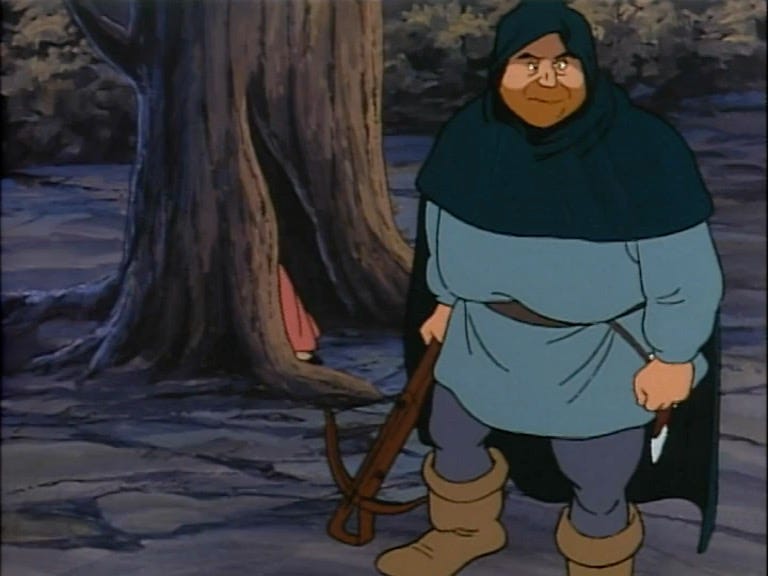
The hunter hesitated. No one had ever asked him that before. Most about to die run or beg for their lives, as if they are guilty.
“The queen ordered me to kill you,” he said gruffly. “So I’d best get it over with quickly.”
“Then let me say my prayers first,” Snow White begged. “I cannot die without my prayers. Please.”
The hunter considered this. “What difference does it make if I kill her now or in a few minutes?” he thought. So he lowered his knife.
“Fine. But be quick about it.”
“Turn your back, please,” she said softly. “I’d feel at peace if I could pray alone, away from watchful eyes.”
Again, the hunter hesitated. Snow White had always been honest and true — why would she lie now? With a grunt, he turned away.
Behind him, Snow White’s voice rose in quiet prayer.
“Dear God, I do not know what I should ask for. But I do know I should not die without a prayer. I do not remember any sins, nor can I think of any reason why I should die. All I have done is stay true to what I believe, for the sake of others…”
Her voice grew fainter and fainter. And then — silence.
The hunter turned. Snow White was gone.
She had fled into the depths of the forest, swift as a deer, already lost among the trees. The hunter cursed under his breath, but deep down, he felt a great weight lift from his chest. No matter, he thought — alone in the wild, especially after dark, Snow White was as good as dead. The beasts would take care of what he could not.
Still, he needed proof. Suddenly, a boar came crashing through the underbrush. He caught it, slit its throat, and cut out its lungs, liver, and heart. For good measure, he filled a phial with its blood. All these he brought to the queen.
“She is dead,” he declared. “Here is the proof.”
Adelaide was elated. Beaming, she handed him a heavy purse of gold. Then, hunger gnawing at her heart, she summoned the cook.
“Boil these in salt water,” she commanded. That night, she devoured the organs, believing she was consuming Snow White’s beauty into her own body. She even sipped the blood from a silver goblet, savouring it like wine.
Meanwhile, when the servants noticed Snow White was missing, they searched for her high and low. But she was nowhere to be found. Grief spread through the castle, and soon the entire realm was in mourning. Many bitter tears were shed. Even Adelaide donned herself in black velvet — though beneath it, she exulted, her lips still stained red with blood.
***
Snow White ran deeper and deeper into the wilderness, not knowing where to go or what to do. The forest was so dense, the trees and bushes pressed in around her, shutting out the light. A wolf howled, driving her one way. An owl screeched, startling her in another. A bat swooped past, sending her down a winding path. Sharp stones bruised her feet, tree bark scraped her skin, and brambles tore at her clothes and tangled in her hair.
On and on she ran, frightened and lost, until she was too exhausted to continue. As the last golden light of day faded, the trees suddenly parted, revealing a small clearing. There, nestled deep in the heart of the forest, stood a quaint wooden house with a tidy veranda and a neatly kept garden. Rows of vegetables and fruit lined the garden, alongside two beehives, a henhouse, an animal shed, and a well.
Snow White hurried eagerly towards the house, hoping to find help. She knocked at the door once — no answer. She knocked again — still nothing. A third time, louder — silence. Hesitating, she tried the handle. The door was unlocked. So weary was she that, against her better judgement, she stepped inside.
The house was as neat and cosy as it looked from the outside, but what struck Snow White the most was how small everything was. On one side of the room stood a little table with seven little stools beside it. The table was set for seven: seven little plates filled with meat and vegetables, seven little cups of wine, seven little knives, seven little forks, and seven neatly folded napkins. Upstairs, she found seven little beds lined up in a row, each covered with a snowy-white quilt.
“How peculiar,” she thought.
Snow White sat on one of the seven stools, waiting for the owners to return. She knew the food wasn’t meant for her, but she was terribly hungry, having eaten nothing all day. So she took a nibble from each plate and a sip from each cup, making sure to leave enough for the owners.
Then, feeling tired, she went upstairs and tried each of the seven little beds. One was too short, the second too long, the third too narrow, the fourth too wide. The fifth was too hard, the sixth was too soft, but the seventh bed was just right. So she lay down, closed her eyes, and before she knew it, she quickly fell asleep.
It was well past dark when the owners of the house returned. They were seven dwarfs, all brothers, who spent their days mining silver, gold, and precious stones in the mountains. As soon as they stepped inside and lit their candles, they noticed something was amiss.
“Look here, someone sat on my chair!” said one dwarf.
“And someone ate from my meat!” said another dwarf.
“And someone ate from my vegetables!” added a third.
“And someone drank from my cup — look, there’s a dribble on it!”
“And used my knife!”
“And used my fork!”
“And used my napkin!”
They looked at each other, eyes wide with bewilderment. “Someone’s broken into our house!” they gasped in unison.
Candles in hand, they looked around the house, searching for the intruder. They tiptoed up the stairs, looked in their beds, and what did they see?
“A girl! A girl is sleeping in my bed!” gasped the biggest dwarf.
“Shush! You’ll wake her up!” whispered the youngest dwarf. “She looks exhausted, poor thing.”
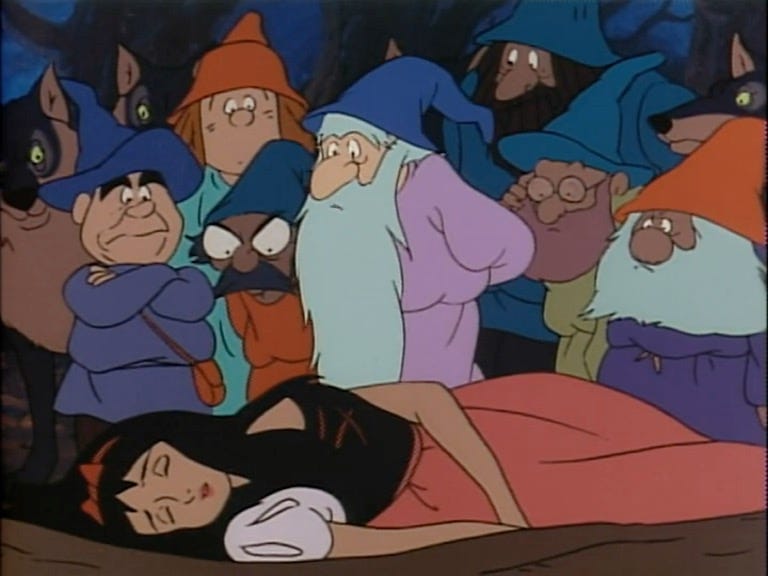
“Whoever can she be?”
“And where did she come from?”
“It’s a mystery, my brothers. A total mystery.”
“She must have gotten lost in the forest,” the youngest dwarf continued. “How else would she have found our house?”
“Better let her sleep,” said the oldest dwarf. “We’ll find out in the morning.”
“Don’t you realise you’re all acting like fools!” huffed the grumpiest of the dwarfs. “She may be an evil spirit, for all we know! We can’t just let someone like that stay here. Mark my words, you’ll all wake up as frogs tomorrow, jumping around the house! I won’t be a part of it. I’ll be sleeping in the animal shed tonight, and I suggest you do the same for your own safety.”
“How generous of you, Thursday, to give me your bed and let the girl sleep peacefully tonight,” said the biggest dwarf with a grin.
The grumpy dwarf was beside himself with fury. “See? See? You’re all under her spell already! Completely bewitched!” he raged, but no one paid him any mind.
So six of the dwarfs slept in their beds that night, careful not to wake Snow White, while the grumpy one had to make do with the cows and goats in the shed.
In the morning, when Snow White awoke, she noticed that the six little beds had been slept in. She could also hear murmuring and humming from downstairs. Snow White became alarmed. What would the owners say when they saw her? Would they welcome her, or would they scold her? After all, she had entered their house without permission. But there was a gentleness in the voices below, a comforting warmth that soothed her fears.
When she descended the stairs, she saw seven little men seated at the table. One of them — the grumpy one — sat with his arms folded, his back turned to his brothers. But the others greeted her kindly.
“There’s no need to be afraid, my dear.”
“We’re quite friendly enough, you’ll see.”
“And we won’t do you no harm. That’s a promise!”
“You must be hungry. Come, sit with us at the table.”
“I’d think twice about that!” muttered the grumpy dwarf.
“Don’t mind him. He spent the night in the shed and is in a sour mood.”
“Now, why don’t you tell us your name, my dear?” asked the oldest dwarf.
“My name is Snow White,” she said. “Please forgive me for intruding into your home. I had nowhere else to go and I was afraid to be alone in the forest.”
“It’s all right, my dear,” the oldest dwarf reassured her. “But how did you come so deep into the forest by yourself? This is dwarf territory, and humans and dwarfs don’t usually mingle.”
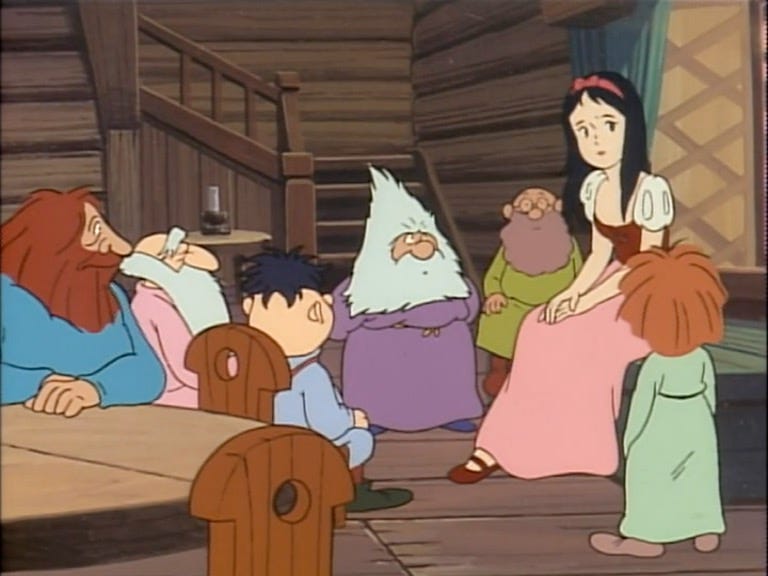
So Snow White told them everything: about her mother, the queen, how she had turned cruel, how she had ordered the hunter to kill her, how she had escaped, and how she had stumbled upon their house. By the time she finished, the dwarfs were dabbing their eyes, even the grumpy one.
“And to think I believed she was an evil spirit,” he sniffed.
“And you have nowhere else to go?” asked the youngest dwarf.
Snow White shook her head. “If I go to my nursemaid Doris’s house, the queen will find me at once,” she said. “And if I go anywhere else, someone is bound to recognise me and tell her.”
“Then you must stay here with us,” said the grumpy dwarf at once. “You’ll be safe from the queen in the forest.”
“Yes, yes!” the others agreed. “Stay with us, and you shall want for nothing.”
“I would love to stay, with all my heart,” Snow White said gratefully. “But how can I repay your kindness? I don’t wish to take your hospitality for granted.”
“You don’t need to do anything for us,” said the oldest dwarf.
“But I insist.”
The dwarfs huddled together, whispering among themselves. At last, they turned back to her.
“Do you know how to cook?”
“I’ve done plenty of cooking back at the castle.”
“Can you sweep and dust?”
“I did that too.”
“Do you know how to sew and mend? Tend the garden? Care for the animals?”
“I never cared much for sewing and mending, but I know a little,” Snow White admitted. “As for the garden and animals, I never had to tend to them at the castle. But I’m willing to learn and work hard for my keep.”
“That’s good to hear,” said the oldest dwarf. “For six days a week, we work in the mines from morning till dusk. We barely have time to care for the house, and our food is always cold when we return. It would be nice to have a little help.”
“I’ll gladly help with the housework,” Snow White said eagerly. “Thank you for letting me stay. But you haven’t told me your names yet.”
And so the dwarfs introduced themselves. They were all named after the days of the week: Sunday was the oldest and the leader of the group — he was responsible, honest, and always fair. Saturday was jovial, always ready with a joke or a gentle word to lift someone’s spirits. Friday was the wisest — he knew the secrets of many things and always gave sound advice. Thursday, the grumpy one, was also the most practical and hardworking (and the most irritable). Wednesday was the biggest and strongest, good-natured and brave, and, like Thursday, a tireless worker. Tuesday was patient and carefree, if a little mischievous sometimes. Monday was the youngest and the kindest, gentle and compassionate, always with a kind word for anyone.
And so it was that Snow White came to live with the seven dwarfs in the forest. They cleaned up their old attic for her and turned it into her own bedroom. They even built her a bed and a chair for the table. At first, each dwarf took turns staying home with her for a week while the others worked in the mountains, but on the seventh day, they were all together.
Besides housework, each dwarf took it upon himself to teach Snow White something different. Monday taught her how to care for the animals — when to milk the cows and goats, how to collect the hens’ eggs, and how to keep them all happy and well-fed. Tuesday showed her how to pick fruits and vegetables from the garden and how to plant and nurture new ones — a task that required great patience. Wednesday taught her how to carry and chop wood, even showing her how to carve wood figurines and furniture.
Thursday, a skilled silversmith, shared a little of his craft with her. He was also a fine cook and taught her some of his best recipes, along with how to improve others. Friday taught her the secrets of the forest — how to distinguish edible plants from poisonous ones, how to make herbal medicines, and how to navigate by the stars. He also showed her how to avoid danger. Saturday taught her the art of laughter — how to see the humour in life and find joy in the smallest of things. Sunday, ever the leader, taught her the best way to manage her chores, but most importantly, he taught her how to listen to others and resolve disputes.
Weeks, and then months, passed. At first, it was difficult for Snow White to adjust to her new life, but she was quick to learn. She worked hard and took great care of the house. She came to love the dwarfs dearly, as the father she had barely known. The dwarfs, in turn, cared for her as if she were their own daughter. Together, they became a big, happy family.
Still, Snow White sometimes thought of the servants in the castle, still living under the rule of the wicked queen. She also wondered about Doris, her old nursemaid, and what had become of her. Though she was safe and content in the dwarfs’ home, a wistfulness would creep into her heart whenever these thoughts crossed her mind.
The dwarfs, who had come to know her well, could sense when something troubled her. “Have you ever thought of going back to the castle to confront the queen?” they asked her one evening.
Snow White’s heart jumped. “I wouldn’t dare,” she said. “At least… not yet. I haven’t even thought of how I would confront her. I’ve been too busy with the housework to consider it.”
But in truth, Snow White was afraid. She remembered how her mother had lashed out at her with the hand mirror when she spoke the truth. She remembered the cruelty that followed, the cold, unfeeling treatment. And worst of all, she feared what the queen would do if she ever saw her again. But she also remembered the fleeting moments of love her mother had once shown her, and it was those memories that made her hesitate. She felt both love and fear, and it left her confused. She didn’t know what to think of her mother anymore — nor what to do.
When she confessed this to the dwarfs, they only smiled kindly.
“It is up to you to decide if you ever wish to return to the castle,” Sunday told her. “But whatever you choose, we will stand by you.”
“We dwarfs live differently to humans,” Friday added. “We live like trees, for hundreds of years. No matter what happens, you will always find a home here.”
In time, life settled into a comfortable rhythm. Every morning, the dwarfs left for the mines while Snow White stayed behind to tend to the house. When they returned in the evening, the cottage was warm, the food was hot, and everything was in order.
Snow White carried out her tasks diligently, always finding small joys in her daily work. But deep down, she felt something was missing — a loneliness she couldn’t quite explain, a sense of being caught in a cycle with no clear way forward.
***
Meanwhile, back at the castle, little had changed, except the servants’ lives had grown wearier with Snow White’s sudden absence. Adelaide, satisfied with her lot, did not consult her magic mirror for several weeks. She wanted it to know she could live without it — even though the mirror was not sentient. So she avoided it altogether.
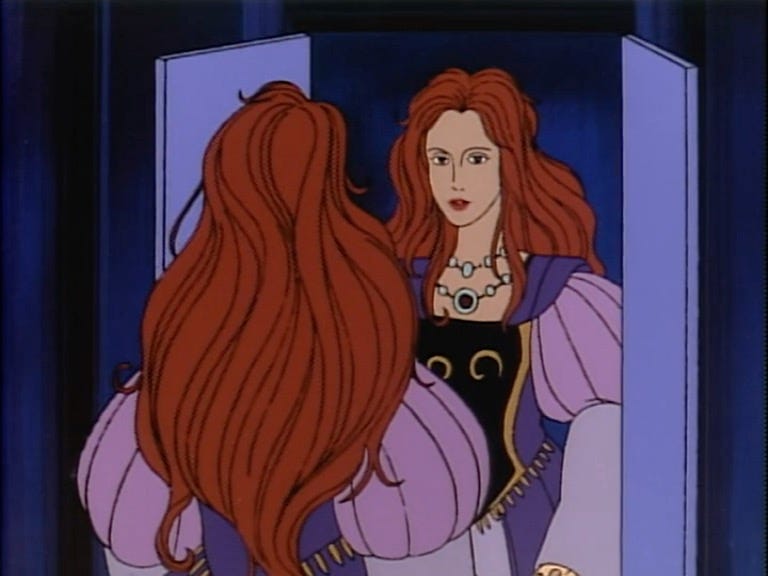
But one moonlit night, she happened to catch her reflection in the mirror. She noticed a few new wrinkles etched beside her lips. Disheartened, she could no longer resist. She stood before the mirror and asked:
“Mirror, mirror, on the wall, Who in this land is the fairest of all?”
And the mirror answered:
“You, my queen, are fair, it’s true,
But Snow White, among seven little men,
In a house tucked away in a hidden glen,
Is far more admired than you.”
At this Adelaide seethed with fury. Her eyes glinted like a serpent’s, her hair bristled like a hedgehog’s. She knew the mirror never lied, so that meant Snow White was still alive. She immediately had the hunter put to death.
But that was not enough. As long as Snow White lived, as long as she was not the fairest in the land, Adelaide would never be at peace. This time, she would not entrust the task to someone else. No one could be trusted to finish the job. If Snow White was to die, Adelaide would have to do it herself. She though and thought about how to do it. Then, a memory stirred — how she used to untie Snow White’s laces at night. And with that, she had her plan.
Slipping away to a hidden staircase, Adelaide made her way to a private room and locked the door behind her. This was where she practiced her dark arts. No one, not even the servants, was ever allowed inside. The room was cluttered with cauldrons, vials, and strange ingredients used for spells and potions.
She searched through her supplies and selected the finest red and purple laces she could find. To make them even more dazzling for Snow White, she cut off most of her own long, silky hair and wove it into them. When they were finally to her liking, she brewed a potion that would draw out the breath of whoever wore them and coated the laces with it.
Rather than waste time searching for the dwarfs’ house, Adelaide enchanted a pair of shoes that would carry her anywhere she wished with no effort at all. Filling a basket with beautifully crafted accessories — the poisoned laces among them — she disguised herself as an old peddler, slipped out of the castle through a secret passage, and set off into the forest.
Snow White was making the beds when she heard a loud knock downstairs. She opened the upstairs window and saw an old, kind-looking woman with a large basket on one arm.
“Good day,” she called down. “How can I help you?”
“Good day, my dear,” said the old woman in a voice that Snow White did not recognise. “I am an old peddler and have many pretty things to sell, if you’re interested.”
“What kinds of things?” Snow White asked.
“Silks and scarves, laces and corsets, and much more,” the peddler said. “Everything to make a beautiful girl like you admired by all.”
Snow White hesitated. “I’m afraid I don’t have any coins to spare,” she said.
“I costs nothing to look,” insisted the old peddler, opening her basket to reveal the colourful accessories inside.
Snow White was entranced by the vibrant colours and luxurious fabrics. She hadn’t seen anything so pretty since she’d left the castle, and she missed trying on beautiful things just for herself.
“And besides, what harm could there be in looking?” she thought.
So she ran downstairs, unbolted the door, and let the old peddler in.
“Goodness, dear, what a sight you are!” said the peddler with feigned surprise. “Your bodice laces are loose and worn-out. Here, look at these lovely ones.”
She pulled out some braided silk laces — the prettiest Snow White had ever seen. They made her think of happier times when her mother would lace her up, even if a little too tightly.
“Would you like to try them on?” asked the peddler. “Come here, dear, let me do up your bodice with these pretty laces. I costs nothing to try them on.”
Trusting as she was, Snow White saw no harm in it. She agreed and stood still as the old woman unthreaded her old laces and replaced them with the new ones. Then, she began to pull — tighter and tighter — until Snow White could hardly breathe.
“Please, good woman, loosen the laces a little,” Snow White gasped. “I can’t breathe.”
“A fine young woman needs a slender waist if she wants to be admired,” the old woman sneered. Her voice had turned menacing and cruel.
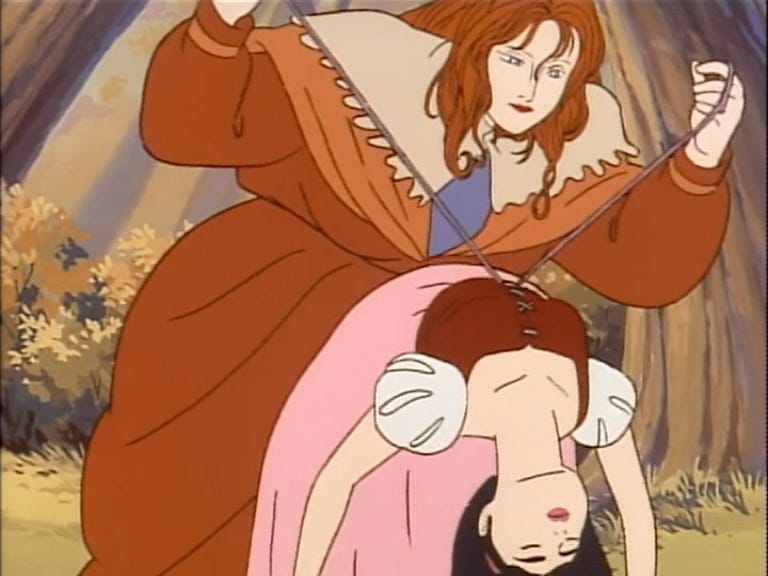
She pulled the laces tighter and tighter, until they squeezed all the breath from Snow White’s body. Her eyelids fluttered, her lips trembled, and her limbs went numb. At last, she collapsed to the floor, unconscious.
Adelaide cackled with glee. “Ha! Now you’re dealt with!” she sneered. “So much for your beauty, my sweet.” She prodded Snow White with her shoe to make sure she was dead, then hurried out of the cottage.
That evening, when the dwarfs came back home as usual, weary from their long day, they noticed immediately that something was wrong.
“There’s no smoke from the chimney!” cried Tuesday, the patient dwarf. “Something must have happened to Snow White!”
The dwarfs ran to the house in alarm and were horrified to find Snow White lying motionless on the floor. They lifted her up gently and noticed right away how tightly she was laced. Thursday, the grumpy dwarf, took out his knife and cut the laces. Snow White gasped and began to breathe again, slowly coming back to life.
“Snow White, who did this to you?” asked Monday, the youngest dwarf.
Snow White thought for a moment. “An old peddler came with a basket of silks and laces,” she said. “She was so kind, offering to lace me up… until she wasn’t.”
“Snow White, that woman was none other than the wicked queen in disguise,” said Friday, the wise dwarf. “Why else would she wish you harm?”
“From now on, you’ll have to be on your guard, Snow White,” said Sunday, the oldest dwarf. “If she was able to find you once, she’ll surely come back. Let no one in the house while we are away.”
“I promise,” said Snow White, sad and afraid.
“We were so worried about you,” said Saturday, the jovial dwarf. “Why did you let that strange woman lace you up?”
Snow White looked down in shame. “Those laces were so pretty, and I wanted to look pretty too,” she said softly. “I’ve been working so much lately that I just wanted a few moments for myself — to feel beautiful, just for me.”
The dwarfs exchanged guilty glances. That evening, they tried to comfort Snow White by preparing supper themselves — with apple strudel for dessert, her favourite — and by singing songs and telling stories of the mountains and mines where they worked. When Sunday came, they presented Snow White with a special gift: a lovely dress, made just her size, in the colours and patterns she liked best. Snow White loved the dress and kissed each dwarf in gratitude.
***
When Adelaide returned to the castle, unseen by anyone, she did not consult her mirror right away. Though she ached to do it, she waited several weeks before communicating with the mirror again, hoping for her hair to grow back. But one day, as she walked by, she glanced into the mirror and saw that her new hair was peppered with grey. She could no longer resist.
“Mirror, mirror, on the wall, Who in this land is the fairest of all?”
The mirror replied:
“You, my queen, are fair, it’s true,
But Snow White, rescued by seven little men,
From the laces that caused her so much pain,
Is far more admired than you.”
Adelaide was so furious to hear that Snow White still lived that she nearly smashed the mirror, but she restrained herself. “This time, I must think of something better, so that Snow White remains dead,” she thought. She pondered and pondered, and soon remembered how she used to comb Snow White’s hair at night. Once again, she had a plan.
Adelaide descended the hidden staircase to her secret room. This time, she brewed a stronger poison, using potions from glass bottles and rare, poisonous herbs. Then she took out a beautiful hair comb, made of gleaming gold and studded with emeralds, very much like the one she used to comb Snow White’s hair with. She pricked her finger on one of the comb’s sharp teeth, for she needed human blood for the poison to have its full effect: Snow White would become dizzy, fall, and never rise again.
When the comb was coated with poison, she placed it in a basket among other hair ornaments, disguised herself as another old woman, slipped on her magic shoes, and left the castle in secret. She made her way into the forest towards the house of the seven dwarfs.
Much to her relief, she found Snow White washing clothes by the river, close to the dwarfs’ cottage. She called out in a different voice than before: “Pretty trinkets for sale! Combs, pins, and mirrors for your lovely hair!”
Snow White was startled when she saw the old woman approaching. But she was in the middle of washing, and the woman had already seen her, so there was no point in running away.
“Ah, a person at last!” said the old woman, approaching Snow White. “May you please let me into your house so I can rest? I’ve made such a long journey to sell my wares.”
“I’m sorry, but I can’t,” said Snow White worriedly. “I’m not allowed to let anyone inside the house. And besides, I have no coins to spare. You’d better go away.”
“That’s all right, my sweet. I’ll just rest here for a while,” said the old woman good-naturedly, as she sat down next to Snow White. “I’m sure no one would mind if you took a look, though. What about this lovely comb — do you like it?”
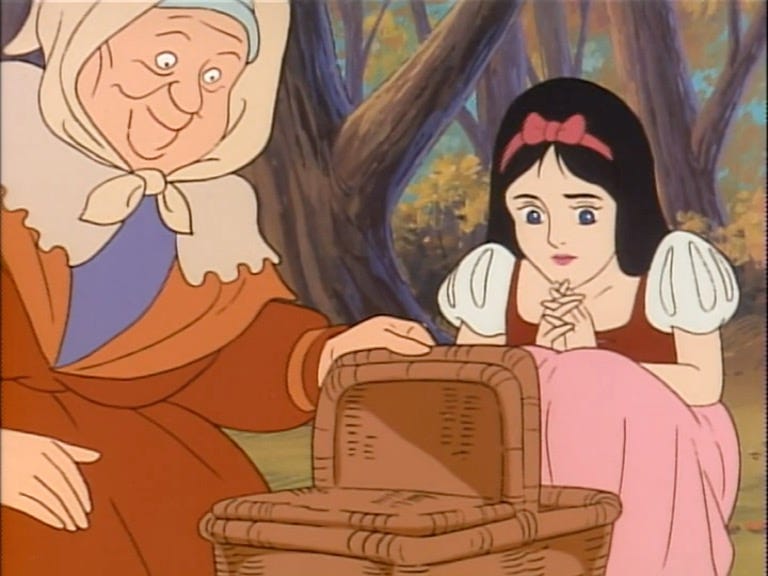
“It is pretty,” said Snow White, looking at the comb, mesmerised. It made her think back to when she was younger, and her mother would gently comb her hair at night. Though she wouldn’t admit it openly, she missed that nightly ritual.
“Oh, such lovely hair you have!” said the old woman, running her fingers through Snow White’s hair. “So black, so rich, so shiny! But good gracious, what a mess it is. All tangles and knots! When was the last time you cared of it?”
“But I brushed it this morning!” said Snow White.
“Brushes are for floors!” said the old woman. “You should use a comb! Here, let me comb it for you — free of charge!”
Snow White thought this was too generous an offer to refuse, so she bent her head down. The old woman quickly pressed the comb into Snow White’s hair, scratching her scalp with the poisoned teeth. Blood trickled down from the comb’s prick. All appeared to spin around Snow White until she could bear it no longer and fell to the ground, unconscious.
“So much for your fine tresses, my sweet!” cackled Adelaide. “Now let us see how is the most admired of all!” And she hurried away before the dwarfs came home.
Luckily, it was almost evening, and not long after Adelaide had left, the dwarf came home. When they didn’t find Snow White anywhere around the house, they became scared and went looking for her. It wasn’t long before Monday, the youngest dwarf, found Snow White lying still and lifeless on the ground near the river. He called for the others to come.
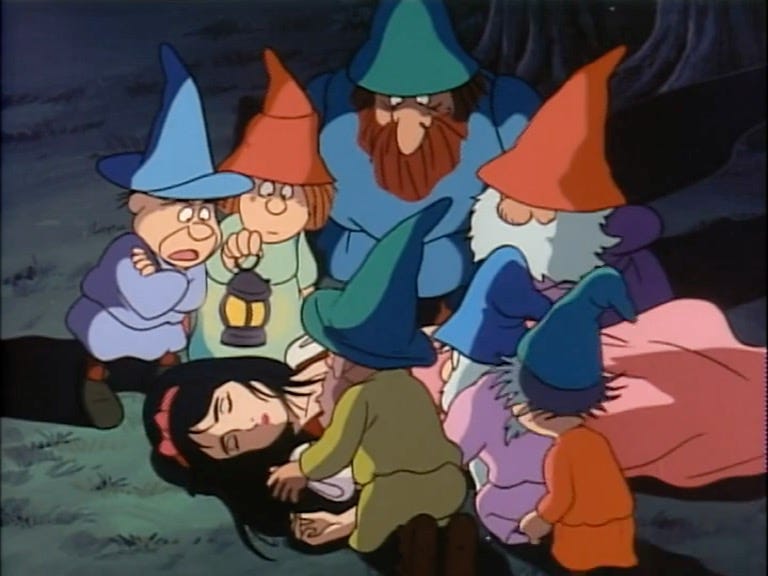
The dwarfs, concerned for her life, searched her body and quickly found the comb stuck fast in her hair.
“This must be the work of that wicked queen,” said Thursday, the grumpy dwarf.
“Quick, we must pull it out,” said Wednesday, the big dwarf.
“Careful, it’s definitely poisoned,” said Friday, the wise dwarf.
Wednesday wrapped a handkerchief around the comb and gently pulled it out. Then Friday swiftly gathered some pond leeches to draw the poison from her scalp. In no time at all, Snow White took a deep breath, opened her eyes, and returned to consciousness. She hugged the closest dwarf to her, which was Thursday.
“Oh, dwarfs, she tricked me again — the queen!” she sobbed. “She didn’t look at all like she did before, and I thought it would be safe. Oh, why was I so foolish?”
Thursday patted her back gently. “Dear child, you simply have a trusting heart and cannot see the evil in others,” he consoled her. “But tell us, how did she trick you into getting that poisoned comb into your hair?”
“She said my hair was full of tangles and knots and needed care,” said Snow White. “I’ve been so busy with work, I hardly had time to look after it. I just wanted it to look beautiful, for myself.”
The dwarfs exchanged looks of shame and concern.
“From now on, try to be on your guard,” said Sunday, the oldest dwarf. “The queen is wicked and cunning, and she will stop at nothing to destroy you. Remember — let no one into the house, and accept nothing from anybody! Now come, let us make supper together.”
That evening, they had apple cake for dessert, and on the following Sunday, the dwarfs gave Snow White a special gift of their own making: a silver comb, beautiful and perfect for untangling knots. Snow White loved the comb and kissed each dwarf in gratitude.
***
Even though Adelaide was certain Snow White was gone for good, she decided to wait before consulting the magic mirror again. She wanted to wait until her beauty had regained at least some of its former radiance.
A month went by, until finally Adelaide could restrain herself no longer. Her reflection in the mirror surprised her: dark bags hung under her eyes, and her skin was marred with spots and wrinkles. Stupefied, she asked:
“Mirror, mirror, on the wall, Who in this land is the fairest of all?”
And the mirror replied:
“You, my queen, are fair, it’s true,
But Snow White, whose seven little men
Freed her from the comb’s poisoned snare,
Is far more admired than you.”
Adelaide’s fury was so intense that she seized a table and smashed it against the mirror. Millions of glass shards fell about the room.
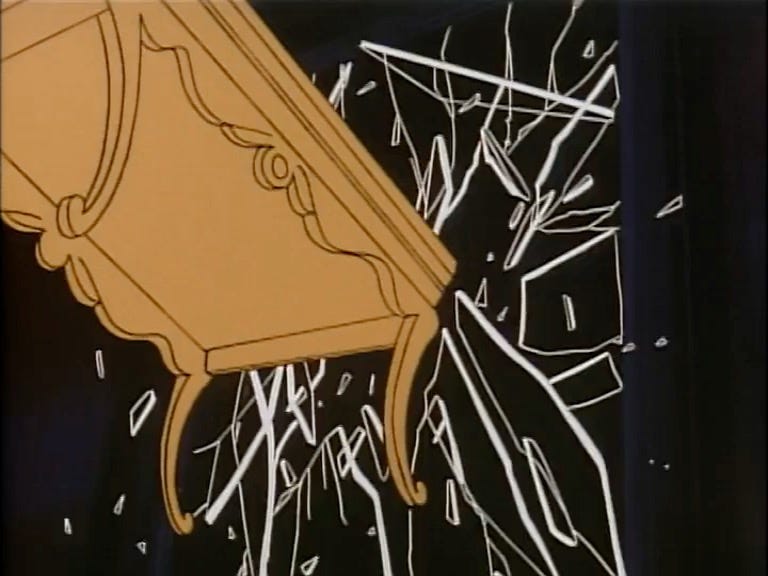
“Snow White shall die!” she declared to the mirror’s broken fragments. “Even if it’s the last thing I do!”
Once more, Adelaide descended the hidden staircase into her secret chamber. With a book of evil spells and several small dark bottles, she set about crafting a deadly poison, twice as strong as the one before. This poison cost her more than her hair or her blood — it cost her the last of her youth and beauty. But Adelaide didn’t care. She was certain that once Snow White was dead, she would find a way to restore both her beauty and the mirror’s power.
When the poison was ready, she took an apple — yellow on one side, bright red on the other — and carefully laced the poison only on the red half. Placing the apple in a basket among other, ordinary apples, she disguised herself as a beggar and set off to kill Snow White. Even with the aid of her magic shoes, Adelaide found the journey through the forest far more tiresome than before. Her legs were weak and aching, but her furious determination drove her on.
When she finally arrived at the dwarfs’ cottage, she called out, “Apples for sale! Fresh, juicy apples! Come and buy!”
Inside, Snow White sat struggling to mend and darn the dwarfs’ socks. When she heard the beggar’s voice, she froze and listened intently. She sat in terrified silence, hoping the old woman would go away.
The beggar knocked at the door. “Fresh apples for sale!” she cooed. “Come now. I know you’re in there.”
“Go away!” Snow White called out. “I cannot let anyone in!”
“That’s all right, my dearie,” said the beggar in a weak, cracking voice. “At least spare some water for a poor old woman. I’ve travelled long and hard, and my throat is parched with thirst.”
“There’s a well near the house,” said Snow White. “Help yourself to water from it.”
The old beggar glanced at the well and smiled a wicked smile, a cunning plan forming in her head. She approached the well and pretended to struggle with the bucket, intending to feign pain. But she truly did feel pain as her arms, like her legs, felt weak and old. Snow White, meanwhile, peeked through a window and saw how much the old beggar struggled.
“Oh, how heavy it is!” the old woman puffed and wheezed. “Oh, how hard it is for my poor old bones! Won’t you please come and help me, my dearie?” Suddenly, she slipped and fell to the ground, groaning in pain as the bucket dropped back into the well — an accident that was no act.
Tenderhearted as she was, Snow White couldn’t bear to see a poor old woman suffer. Without thinking, she unbolted the door, crossed the threshold, and ran to the old woman, carrying a pitcher of water in one hand and a cup in the other. She helped the beggar up and guided her to a shaded spot on the veranda.
“Here,” said Snow White, pouring water into the cup and offering it to the old woman. “Drink, please.”
The old beggar drank gratefully, for she truly was thirsty from her long walk through the forest. “Why, thank you, my dearie.”
“It was awful of me to be suspicious of a poor old woman and to let you struggle so much,” said Snow White. “I’m so sorry.”
“There’s no need to apologise, my dearie,” said the old woman kindly. “You never know whom to trust these days. It was good of you to be caution. I only wish I could repay your kindness.”
“There’s no need for that,” said Snow White. “I do hope you feel better.”
“No good deed should go unrewarded, my dearie.” The old woman rummaged in her basket and pulled out a red-and-yellow apple. “Please, accept this apple from me.”
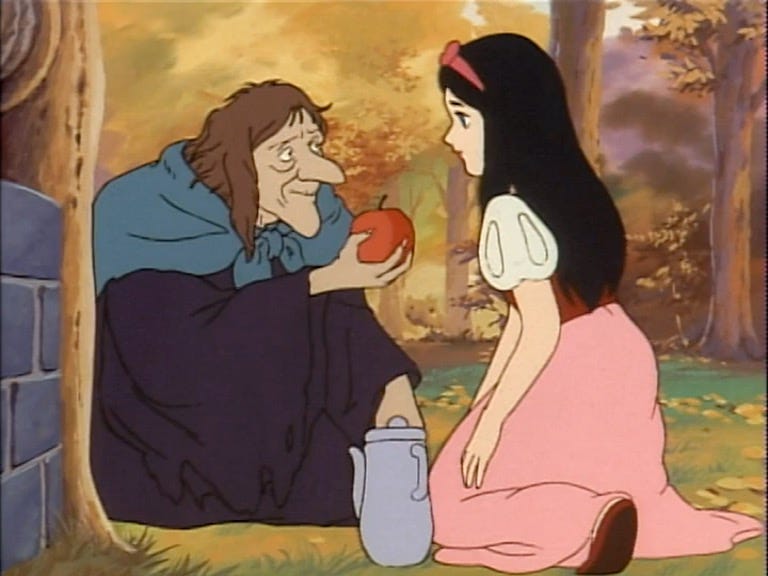
“I’m sorry, but I’m not supposed to accept anything from anyone,” said Snow White.
“Oh, what a pity,” sighed the old woman. “And they taste so good. Don’t you like apples, my dearie?”
“Oh yes, I love apples,” said Snow White. “It’s just that—”
“Are you afraid it might be poisoned?” the old woman asked. “Here, I’ll take a bite first.”
She took out a knife, cut the apple in half, and bit into the yellow side, which was safe to eat. Then she offered Snow White the red half. “Rosy, just like your cheeks!” she cooed.
Now, Snow White loved apples, and this one looked especially delicious. It reminded her of the times when her mother fed her apple slices at night. Seeing the old woman eat the apple unharmed, she couldn’t resist any longer. She took the red half, bit into it… and began to choke. In a matter of seconds, she fell to the ground, lifeless.
Adelaide cackled with glee. “White as death, red as rage, black as the pits of hell. Those wretched dwarfs won’t be able to save you this time!”
Her laughter rang loud through the forest as she slithered away.
***
When the dwarfs came home in the evening, they found Snow White lying still and lifeless on the ground once again. They saw the half-eaten apple next to her and guessed right away what had happened.
They tried everything they knew to revive her. They loosened her laces and searched her hair to see if there were any poisonous objects about her. They found none. They laid her on a bed, sat her up in a chair, warmed her by the fire, and brought her to the cool mountain air. They even placed a drop of brandy on her lips. But nothing helped. All their love and tears could not stir her. As far as they could tell, she was well and truly dead.
And so the world became dark and gloomy for the dwarfs. For three days and three nights, they mourned, unable to believe that they had lost her.
“We can’t have lost her forever,” wept Wednesday, the big dwarf.
“She was so full of life,” wept Monday, the youngest dwarf. “So kind and friendly.”
“And so young and trusting,” wept Thursday, the grumpy dwarf. “If only she had been more careful.”
“She was lonely and desperate,” wept Friday, the wise dwarf. “All alone in the house with no one for company.”
“Indeed, she was such great help to us,” wept Tuesday, the cheeky dwarf.
“And she made our days so much brighter and more fun,” wept Saturday, the jovial dwarf.
“She was like a dear, sweet daughter to us, and we loved her so,” wept Sunday, the oldest dwarf.
Perhaps they loved her so much that they refused to accept that she was truly gone. Or perhaps there was something else. For during their days of mourning, the dwarfs noticed that Snow White’s body did not grow stiff and decay as a corpse should. Her checks remained warm and rosy, as if she were only sleeping. She still looked as white as snow, as red as blood, and as dark as ebony, but her eyes, as blue as the sea, remained closed.
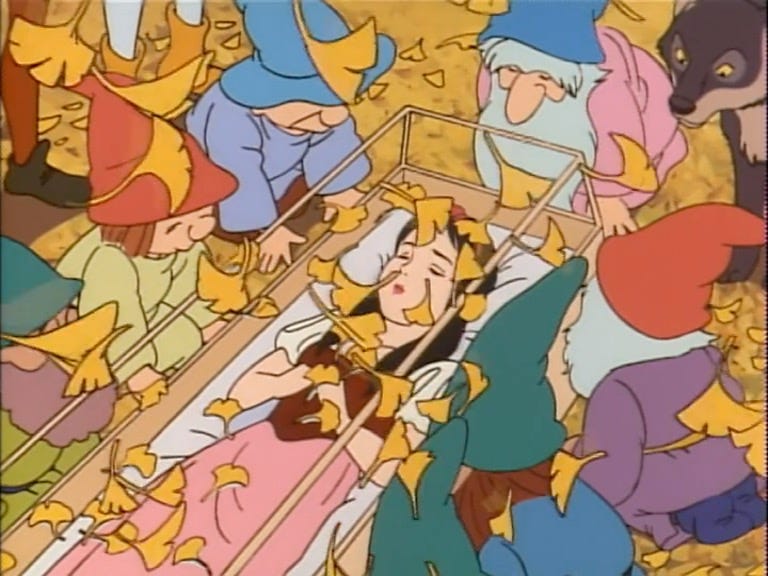
To part with her in a special way, the dwarfs made a coffin of glass, inlaid with jewels from the mountain, and with her name graved on it in gold. They placed Snow White’s body inside and together carried the coffin up towards the mountain, intending to bury her there.
The animals of the forest gathered to watch the sorrowful procession, mourning for poor Snow White. Birds came too, each leaving a parting gift on the glass coffin: first an owl, with a red rose in its beak, then a raven, which left a black feather, and finally a dove, which left a white feather.
The dwarfs, carrying the coffin around in a circle, their hearts heavy with grief and their eyes filled with tears, did not notice the woman approaching behind them. They were unaware of her presence until she spoke.
“Excuse me, kind sirs, but is it Snow White who lies in that coffin?”
Surprised, the dwarfs gently placed the coffin down and turned around. Before them stood a portly, gentle-looking old woman, her eyes brimming with tears. There was something kind and honest about her that made the dwarfs trust her right away.
“Yes, it is Snow White, unfortunately,” sobbed Sunday, the oldest dwarf. “Did you know her?”
“I am Doris, her nursemaid. I took care of her from the day she was born, like a mother,” she replied. “The queen, whom I also cared for since she was a child, cast me out of the castle after the king’s death. Snow White would visit me whenever she could, until the queen’s guards captured her. Shortly after, a servant informed me that Snow White had gone missing. I knew it must have been the queen’s doing, so I searched for her in secret. But alas, it seems I have come too late.”
“Yes, Snow White spoke often of you,” said Sunday. “She loved you very much.” And the dwarfs told Doris everything that had happened.
By the end of the story, Doris wept uncontrollably. Monday, kindhearted as always, stepped forward to comfort her. “Here, take my handkerchief,” he said gently.
“May I kiss Snow White one final goodbye?” asked Doris. “The way I used to kiss her goodnight when she was younger?”
Monday glanced at his brothers, and when they all nodded, he did too.
Doris approached the coffin, carefully removed the glass lid, and bend down to Snow White’s body. “Goodbye, my dear Snow White,” she whispered, kissing her gently on the forehead.
Suddenly, a tiny tremor went through Snow White’s body, and she began to stir. She coughed, and a piece of the poisoned apple flew out of her mouth. Then, for the first time in so long, Doris saw Snow White open her eyes — blue as the sea, innocent and deep. She was alive!
Astonished, Snow White sat up and looked around, bewildered. “Goodness me, what has happened? Where am I?” Then she turned and saw Doris, whom she hadn’t seen in so long, and began to cry as she hugged her tightly.
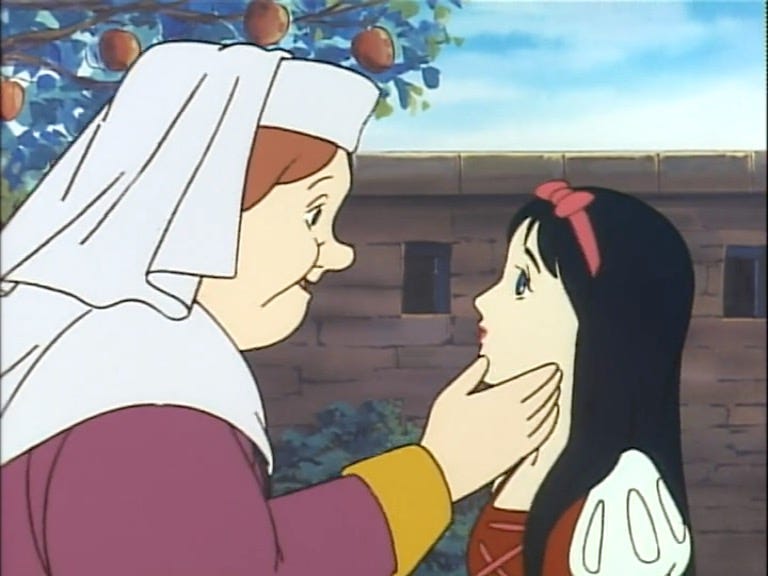
“Oh, Doris, I’m so glad to see you again!” she cried. “I’ve missed you so much!”
“Me too, my dear child. Me too,” Doris replied, hugging her back.
The dwarves shouted with joy upon seeing that Snow White was alive. They danced and jumped and made merry, their tears mingling with laughter that echoed deep into the forest. For the poison the queen had used worked because of her hatred. The dwarfs’s love had been strong enough to defeat it twice before, but the third poison was too powerful. Only the love of a mother could cure the hatred of another.
***
And so they all returned to the dwarfs’ cottage and celebrated for seven days and seven nights. During this time of rejoicing, Doris told Snow White of all the terrible things the queen had done in her absence. At the end of it, Snow White made a decision.
“I’m going back to the castle.”
“But what about the queen?” asked Sunday, the oldest dwarf. “Aren’t you afraid to confront her?”
“I was,” said Snow White, pausing for a moment. “But wherever I go, even if I were at the end of the world, the queen — my so-called mother — would find me and try to harm me.” She sighed sadly. “Even if it pains me to see her hatred, I can’t run forever. So instead, I will go back to the castle, confront her, and free the many lives I’ve allowed her to torment, including my own.”
The dwarfs nodded approvingly, and so did Doris.
Snow White turned to the dwarfs. “Will you come with me?” she asked. “With your help, we can defeat the queen, and I will give you places of honour at court.”
The dwarfs exchanged worried glances. “That’s kind of you, Snow White,” said Sunday, “but the human realm is not suited for us. We are happiest here in the realm of the dwarfs. You’ll have to face the queen on your own.”
Before Snow White could protest, the dwarfs retrieved a beautiful diadem from a chest and presented it to her. It was made of pure silver and set with seven diamonds from the mountain.
“Each diamond represents a dwarf,” said Sunday. “Wear this diadem, and we will always be close to you.”
“You’re grown so much,” added Monday, the youngest dwarf. “We trust that you’ll do well.”
Snow White smiled through her tears. “Thank you for everything,” she said, hugging and kissing each dwarf goodbye. Then, along with Doris, she made her way to the castle, ready for whatever lay ahead.
But when they arrived, they discovered that the queen was no longer there. She had disappeared not too long ago, leaving behind only shards of her broken mirror. Snow White and Doris were welcomed with great joy. The people rejoiced that their princess was alive and well, but they also noticed something different about her: whereas before she had been timid and quiet, now she was outspoken and brave. Because of her kindness and nobility, and as the last surviving member of the royal family, Snow White was crowned queen by the people of the land.
Snow White never forgot the lessons the dwarfs had taught her, and she used their wisdom to rule with fairness and kindness. She became a just and beloved queen, more cherished than any ruler before her. Though she carried herself with grace and dignity, Snow White never lost her true nature. She continued to dress as she pleased, speak her mind, and care for the needs of her people.
Of course, the whispers came for her as well.
“No queen would say such a thing.”
“No queen would act that way.”
“No queen would wear such a gown.”
Snow White felt the weight of their words, but having grown up surrounded by both kindness and cruelty, she never let those whispers linger in her mind. She scolded those who were impertinent and dismissed those who were treacherous. Now, Snow White was as bold as she was kind and fair.
Doris stood faithfully by her side, and Snow White honoured her as the woman who had loved her like a mother. But Doris was very old, and eventually she died. Snow White grieved deeply and gave her one final goodbye kiss on her forehead, just as Doris had once kissed her. This time, Doris did not wake. She was well and truly gone, and Snow White buried her beside her father’s grave.
Snow White never forgot the kind dwarfs. Whenever she could, she travelled into the forest to visit them in their cottage. Together, they celebrated and made merry, just as they had in the old days, wishing each other long and happy lives.
A year had passed since Snow White became queen. One day, as she walked through the castle garden, searching for the crispiest apple, she overheard the guards talking about an old hag wailing in the dungeon.
“She moans and cries every day,” recounted one guard to the other, “screaming that she is the fairest in the land.”
Something stirred in Snow White’s heart. She approached the guards and asked, “Do you know who this old woman is?”
“No idea, Your Majesty” said one guard. “She once tried to break into the castle, claiming in her madness to be the previous queen.”
“She came shortly after the former queen disappeared,” said the other guard. “We found shards of glass in her chamber, and a secret stairway leading to a room filled with cauldrons and potions. We suspected she had something to do with the queen’s disappearance, so we sealed the passage. When she returned, she came at us with such violence that we had to throw her in the dungeon, where she has remained ever since.”
Snow White was silent for a moment, before saying, “Take me to this hag.” The guards looked at each other in disbelief, but she insisted. “Please!”
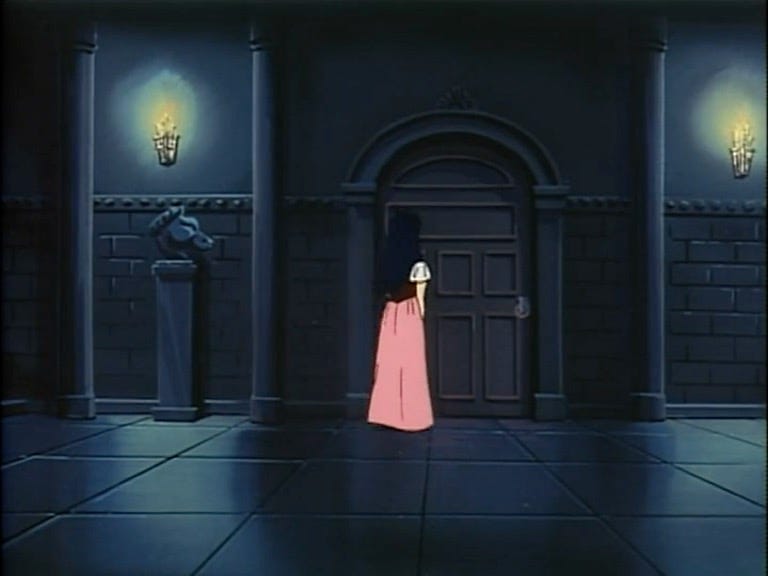
The guards led Snow White into the dungeon, where she found an old woman sitting on a stool in the centre of a dark cell, staring up at a small window. The woman’s face was withered with sorrow and bitterness. When she turned and looked at Snow White, her expression twisted into a scowl.
Snow White gasped. The woman was none other than the peddler who had given her the poisoned apple. But as she looked more closely, she recognised Adelaide — her birth mother, now withered and old, a shadow of her former self.
For a long time, neither of them spoke, too afraid to meet each other’s glare. Finally, Adelaide broke the silence.
“So, you are the queen now.”
“It is true,” said Snow White. “I inherited the throne after you and Father.”
“To what do I owe this honour?” Adelaide sneered. “Have you come to watch me wither away?”
“On the contrary,” Snow White said softly. “I’ve come to understand.”
“Understand what?” Adelaide asked harshly.
“Why you did what you did,” Snow White replied. “Why you tried to kill me.”
“I think you know the answer already,” Adelaide said bitterly. “In this world, kindness is weakness. People will always find a way to hurt you, no matter how good you are to them. I had to fight for my place, while you were born destined to rule. I sacrificed everything for power, and kindness did me no favours.”
“The same people who judged you judged me as well,” Snow White said. “I may have been born a princess, but I had to fight for my place too. I had to be both strong and kind to survive. And for that, perhaps I owe you thanks.”
Adelaide sniffed. “So what now? Are you here to see me punished?”
“I seek justice, not vengeance,” declared Snow White. “You committed crimes against our people, against me, and against yourself. For that, I banish you from this realm. A guard will accompany you as you leave. You may go wherever you please, but you are never to return.”
Astonished, the guards did as Snow White commanded and released Adelaide from the dungeon. Adelaide was shocked by Snow White’s mercy, but said nothing. She hobbled away from the castle, alone and ashamed. However, it wasn’t long before the guard returned with news: Adelaide had collapsed and died on the way out. Seeing Snow White so happy and unburdened by the past, her weak heart was consumed by rage, and it soon simply burst. Snow White ordered that Adelaide be buried beside her father and Doris.
***
Once a year, on a winter’s night, on the very day she was born, a young queen was seen visiting three graves. One belonged to her father, the second to her mother, and the third to her nursemaid. On each grave, Snow White placed a red rose, a black feather, and a white feather. For all three, she felt pity. For within her shone a kind of beauty that no mirror could reveal — the beauty of a kind and noble heart.
Author’s Note
After “Cinderella,” “Snow White” may be the most popular and widely disseminated of all folk and fairy tales. Variations of this story can be found all over the world, each with its own distinctive details. The queen may be an innkeeper or two sisters; she may consult the sun, the moon, or some animal; the dwarfs may be robbers, hunters, giants, dragons, or even knights. The objects used to poison the protagonist include fruit, clothing accessories, or hair ornaments. But the core theme of the story remains the same regardless of version: a young woman persecuted because of her beauty.
The oldest-known version of “Snow White” is thought to be the story of Chione from Ovid’s Metamorphoses. Another ancient variant, which would later inspire the famous version collected by the Grimms, appears in an Old Norse saga about King Harald Fairhair in Snorri Sturluson’s Heimskringla. Traces of this tale can also be found in William Shakespeare’s Cymbeline. There are even historical figures who may have influenced the story, including Margarete von Waldeck and Maria Sophia von Erthal.
The version we know today as “Snow White” (“Sneewittchen” in Low German, “Schneewittchen” in modern High German) was collected by the Grimm Brothers from the Hassenpflug family. In the notes to the first edition of their collection, Children’s and Household Tales, the Grimms listed three different variants of the story. One of these, about a count and countess who adopt a child as white as snow and later abandon her, served as the basis for Angela Carter’s retelling “The Snow Child” from The Bloody Chamber. The version that appears in their collection is essentially a composite of the many variants they received.
In the first edition of the story, it was Snow White’s birth mother who wanted to persecute her. To align with their idealised image of motherhood, the Grimms later changed her into a stepmother. Though my retelling is based on the seventh, more polished edition, I have retained the birth mother from the first edition. This was done partly to dispel the wicked stepmother trope, but mostly because, in my opinion, it makes no real difference to the story whether it’s a birth mother or stepmother.
The story’s popularity was cemented by Walt Disney’s Snow White and the Seven Dwarfs (1937), the first animated feature film made in colour and sound. Disney’s film was inspired by a 1912 Broadway play by Winthrop Ames, which was the first adaptation to give the dwarfs names. Since then, practically every adaptation of the story has been influenced by the iconic Disney film, either in homage or as a response to it.
The conflict between Snow White and the queen has been interpreted by certain psychologists, most famously by Bruno Bettelheim, as Oedipal: the two are in competition for the love and affection of the absent father. Sandra Gilbert and Susan Gubar have taken this view further in their book The Madwoman in the Attic, claiming:
“The central action of the tale—indeed its only real action—arises from the relationship between these two women, the one fair, young, pale, the other just as fair, but older, fiercer; the one a daughter, the other a mother; the one sweet, ignorant, passive, the other both artful and active; the one a sort of angel, the other an undeniable witch.”
To Gilbert and Gubar, the father represents the voice of the magic mirror, “the patriarchal voice of judgment that rules the queen’s—and every woman’s—self-evaluation.” This interpretation overlooks the broader theme of human jealousy and competition, which extends beyond a purely patriarchal framework. As YouTuber Patience Xina pointed out:
““Snow White” talks about real themes of how women can be jealous of each other and how women can compete with each other for things like attention. There are women who absolutely will put other women down or who will be quite vicious towards other women. It (also) talks about the very real reality of girls who may have narcissistic mothers who compete with their daughters. Even though Snow White is being portrayed as the fairest of them all, she doesn’t seem to be interested in all of that. She seems to just really enjoy taking care of people, whereas the queen is the complete opposite. She’s very consumed with her appearance and she’s obsessed with the mirror.”
In my retelling, I have endeavoured to highlight these themes in a way that would speak more directly to readers of today.
The character of Doris the nursemaid is based on the various nursemaid figures that appear in certain adaptations of the story. She is partly inspired by my own Nana, who took care of me during my formative years while my parents were away at work. In many ways, the core themes of my adaptation reflect my own feelings about my Nana, who passed away when I was in middle school. This retelling is dedicated to her memory.
Bibliography
Source Material
Grimm, Jacob and Wilhelm Grimm. “Grimm 053: Little Snow-White.” Translated by D. L. Ashliman. sites.pitt.edu, https://sites.pitt.edu/~dash/grimm053.html. Accessed 25 February 2025.
Grimm, Jacob and Wilhelm Grimm. “Snow White.” The Complete Fairy Tales of the Brothers Grimm. Translated by Jack Zipes. 1987. Vintage, 2007.
Grimm, Jacob and Wilhelm Grimm. “Little Snow-White.” The Complete Grimm’s Fairy Tales. Translated by Margaret Hunt, revised by James Stern. 1944. Pantheon Books, 1972.
Grimm, Jacob and Wilhelm Grimm. “Snowdrop.” Grimm’s Fairy Tales. Translated by Edgar Taylor and Marian Edwardes. Project Gutenberg, https://www.gutenberg.org/files/2591/2591-h/2591-h.htm. Accessed 25 February 2025.
Grimm, Jacob and Wilhelm Grimm. “Little Snow-White.” Grimm’s Household Tales. Translated by Margaret Hunt. George Bell and Sons, 1884.
Grimm, Jacob and Wilhelm Grimm. “Snow White.” Grimms’ Tales for Young and Old. Translated by Ralph Manheim. 1977. Anchor Books, 1983.
Grimm, Jacob and Wilhelm Grimm. “Snow-white.” Household Stories. Translated by Lucy Crane. 1886. Dover Publications, Inc., 1963.
Grimm, Jacob and Wilhelm Grimm. “Little Snow White.” The Original Folk and Fairy Tales of the Brothers Grimm: The Complete First Edition. Translated by Jack Zipes. Princeton University Press, 2014.
Lang, Andrew, editor. “Snowdrop.” The Red Fairy Book. Longmans, Green, and Co., 1890.
Tatar, Maria, editor. “Snow White.” The Annotated Brothers Grimm. W. W. Norton & Company, 2004.
Variants and Scholarly Work
Anderson, Graham. “Snow White and related tales.” Fairytale in the Ancient World. Routledge, 2000.
Artese, Charlotte, editor. “Cymbeline.” Shakespeare and the Folktale: An Anthology of Stories. Princeton University Press, 2019.
Ashliman, D. L., editor. “Snow-White and other tales of type 709.” sites.pitt.edu, https://sites.pitt.edu/~dash/type0709.html. Accessed 25 February 2025.
Bettelheim, Bruno. “The Jealous Queen in “Snow White” and the Myth of Oedipus,” “Snow White.” The Uses of Enchantment: The Meaning and Importance of Fairy Tales. 1976. Vintage Books, 1989.
Charles, Veronika Martenova. It’s Not About the Apple!: East-to-Read Wonder Tales. Tundra Books, 2010.
“Femininity and Romance are Bad... Apparently.” YouTube, uploaded by Patience Xina, 29 August 2023, https://www.youtube.com/watch?v=cvsKaK4SJNI. Accessed 25 February 2025.
Gilbert, Sandra M., and Susan Gubar. “The Queen’s Looking Glass: Female Creativity, Male Images of Women, and the Metaphor of Literary Paternity.” The Madwoman in the Attic: The Woman Writer and the Nineteenth-Century Literary Imagination. 1979. Yale University Press, 2020.
Gray, William, Joanna Gilar and Rose Williamson. The World Treasury of Fairy Tales & Folklore: A Family Heirloom of Stories to Inspire & Entertain. Wellfleet Press, 2016.
Griffin, Ashley. “Do We Really Understand “Snow White”? How We Tell Fairy Tales in Modern Times & Why it Matters.” OnStageBlog, 21 September 2023, https://www.onstageblog.com/stage-directions/2023/9/21/do-we-really-understand-snow-white. Accessed 25 February 2025.
Gunderson, Jessica. Snow White Stories Around the World: 4 Beloved Tales. Picture Window Books, 2015.
Hallett, Martin and Barbara Karasek. “Growing Up (Is Hard to Do).” Folk & Fairy Tales. 5th ed., Broadview Press, 2018.
Morel, Fabienne, and Gilles Bizouerne. Les histoires de Blanche-Neige racontés dans le monde. Syros Jeunesse, 2007.
Opie, Iona and Peter. “Snow White and the Seven Dwarfs.” The Classic Fairy Tales. 1974. Oxford University Press, 1980.
Pullman, Philip. “Snow White.” Grimm Tales: For Young and Old. Penguin Books, 2012.
Ryan, Patrick. “Snowdrop: As You Like It.” Shakespeare’s Storybook: Folk Tales that Inspired the Bard. Barefoot Books, 2001.
The Tale of the Dead Princess and the Seven Knights (Skazka o myortvoy tsarevne i o semi bogatyryakh). Directed by Ivan Ivanov-Vano and Aleksandra Snezhko-Blotskaya, Soyuzmultfilm, 1951.
Tatar, Maria. The Fairest of Them All: Snow White and 21 Tales of Mothers and Daughters. The Belknap Press of Harvard University Press, 2020.
Tatar, Maria, editor. “Snow White.” The Classic Fairy Tales. 2nd ed., W. W. Norton & Company, 2017.
Zipes, Jack, editor. “Evil Stepmothers and Magic Mirrors.” The Golden Age of Folk and Fairy Tales: From the Brothers Grimm to Andrew Lang. Hackett Publishing Company, Inc., 2013.
Retellings and Adaptations
Block, Francesca Lia. “Snow.” The Rose and the Beast: Fairy Tales Retold. HyperCollins Publishers Inc., 2000.
Carter, Angela. “The Snow Child.” The Bloody Chamber and Other Stories. 1979. Vintage, 2006.
Chainani, Soman. “Snow White.” Beasts and Beauty: Dangerous Tales. Harper, 2021.
Colfer, Chris. “Snow White.” The Land of Stories: A Treasury of Classic Fairy Tales. Little, Brown and Company, 2016.
Colfer, Chris. The Land of Stories: The Wishing Spell. Little, Brown and Company, 2012.
Donnelly, Jennifer. Poisoned. Scholastic Press, 2020.
Donoghue, Emma. “The Tale of the Apple.” Kissing the Witch. 1997. Picador, 2013.
Dunbar, Joyce. Snow White. Scholastic Press, 2005.
Jenkins, Emily. “Snow White.” Brave Red, Smart Frog: A New Book of Old Tales. Candlewick Press, 2017.
Kingfisher, T. “Boar & Apples.” Toad Words and Other Stories. Red Wombat Tea Company, 2014.
Kitsis, Edward and Adam Horowitz, creators. Once Upon a Time, seasons 1 and 2. Kitsis/Horowitz and ABC Signature, 2011-2013.
McKay, Hilary. “Chickenpox and Crystal or Snow White and the Seven Dwarves.” Hilary McKay’ Fairy Tales. Macmillan Children’s Books, 2017.
Murrow, Vita. “Snow White.” Power to the Princess: 15 favourite fairytales retold with girl power. Lincoln Children’s Books, 2018.
Pageau, Jonathan. The Tale of Snow White and the Widow Queen. Symbolic World Press, 2023.
Poole, Josephine. Snow White. Alfred A. Knopf, 1991.
Sampson, Laura. “Snow White.” Enchanted Tales: Stories from Around the World. Templar Books, 2023.
“Schneewittchen.” Sechs auf einen Streich, directed by Thomas Freundner, Saxonia Media Filmproduktionsgesellschaft, Moviepool, and Bayerischer Rundfunk (BR), 2009.
“Schneewittchen und der Zauber der Zwerge.” Märchenperlen, directed by Ngo The Chau, Provobis Gesellschaft für Film und Fernsehen, and MIA Film, 2019.
“Snow White.” Grimm Masterpiece Theatre (Gurimu meisaku gekijō) or Grimm’s Fairy Tale Classics, directed by Hiroshi Saitō and Kerrigan Mahan, Nippon Animation and Saban Entertainment, 1987-88/89.
Snow White and the Seven Dwarfs. Directed by William Cottrell, David Hand, and Wilfred Jackson, Walt Disney Productions, 1937.
“Snow White and the Seven Dwarfs.” Faerie Tale Theatre, directed by Peter Medak, Gaylord Productions, Lion's Gate Films, and Platypus Productions, 1984.
Snow White: The Fairest of Them All. Directed by Caroline Thompson, Hallmark Entertainment, 2001.
Willa: An American Snow White. Directed by Tom Davenport, Davenport Films, 1998.



